Understanding Your Dog’s Instincts
You might have noticed your dog acting strangely around you when you sustain a wound. This behavior is not just random; it’s deeply rooted in their instincts. Dogs, like their wild ancestors, are pack animals. When a member of the pack gets injured, others lick the wound. This instinctive behavior promotes healing and signifies care for the wounded individual.
- Instinctive Healing: Dogs have antibacterial agents in their saliva which can promote healing.
- Pack Care: Licking is a form of social behavior in dogs, demonstrating care and concern for a member of the pack.
The Science Behind Dog Saliva
While it may seem odd to us, there’s a science to why dogs lick wounds. Their saliva contains certain enzymes that kill bacteria and promote healing. However, it’s important to note that while this may have worked for their wild ancestors, it isn’t necessarily the best course of action for humans.
- Lysozyme: This enzyme kills bacteria by damaging their cell walls.
- Peroxidase: It halts bacterial growth by oxidizing their metabolic functions.
- Defensins: These proteins disrupt the internal structures of bacteria.
| Enzyme | Function |
|---|---|
| Lysozyme | Kills bacteria by damaging their cell walls |
| Peroxidase | Halts bacterial growth by oxidizing their metabolic functions |
| Defensins | Disrupts the internal structures of bacteria |
When It’s Not Helpful
Despite the presence of antibacterial agents in dog saliva, their mouths also harbor a variety of bacteria, some of which can be harmful to humans. Thus, allowing your dog to lick your wounds can potentially lead to infection.
- Harmful bacteria: Dogs’ mouths are home to various bacteria, some of which can be harmful to humans.
- Allergic reactions: Some people might be allergic to dog saliva.
Preventing Wound Licking
If your dog insists on licking your wounds, there are several strategies you can use to deter this behavior.
- Distraction: Give them a toy or a treat to divert their attention from your wound.
- Use a bandage: Cover your wound with a bandage to prevent direct contact with your dog’s saliva.
- Training: Train your dog to understand the command “no” when they attempt to lick your wound.
Frequently Asked Questions (FAQs)
Q: Can dog saliva really help heal wounds?
A: While dog saliva does have antibacterial properties, it’s not advisable to let your dog lick your wounds due to potential risks.
Q: Are there any risks if I allow my dog to lick my wounds?
A: Yes, dogs’ mouths also contain harmful bacteria which can lead to infection.
Q: How can I stop my dog from licking my wounds?
A: You can distract them, use a bandage, or train them to understand the command “no”.
So, the next time you find your furry friend trying to lick your wounds, remember they’re just trying to take care of you as you would take care of them. However, it’s essential for both of your health to ensure proper wound care – and that generally means keeping your pooch’s tongue away from your cuts and scrapes.



